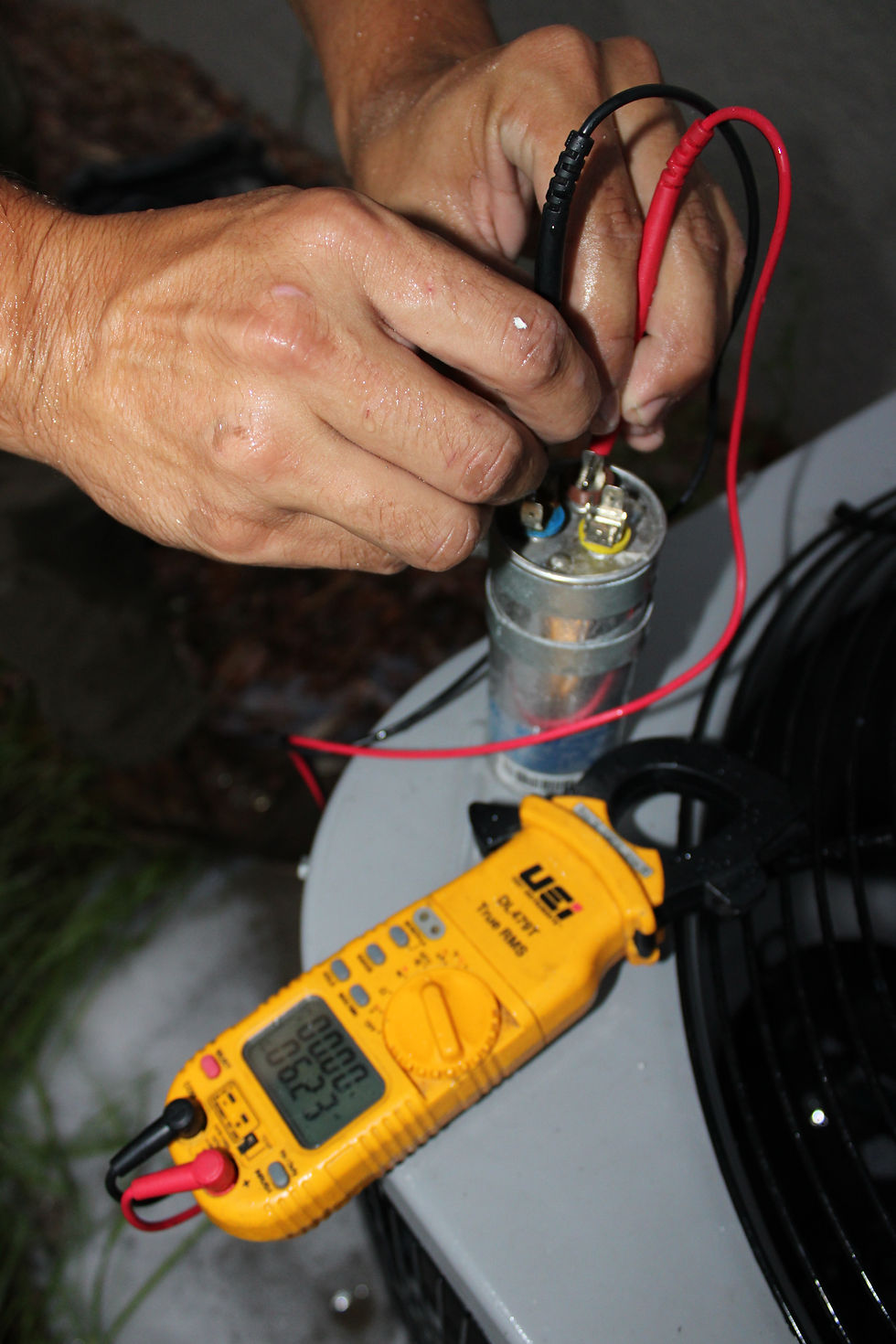Troubleshooting Common AC Problems: DIY Tips and When to Call a Pro
- Jean Swafford
- Nov 21, 2024
- 4 min read
Introduction
When the heat and humidity rise, a functioning air conditioner is essential for comfort. But what if your AC starts acting up? From blowing warm air to strange noises, AC issues can be frustrating. Fortunately, some problems can be resolved with basic troubleshooting, while others require professional expertise. Here’s a guide to common AC problems, DIY solutions, and when it’s time to call a pro.

1. AC Won’t Turn On
If your air conditioner isn’t turning on, it could be due to several factors.
Check the Thermostat: Make sure your thermostat is set to "Cool" and set to a temperature lower than the current room temperature. Replace the batteries if it’s battery-operated.
Check the Power Supply: Confirm that the AC unit is receiving power. Check the circuit breaker for any tripped switches.
Inspect the AC Switch: Some outdoor units have a power switch nearby. Ensure it is in the "On" position.
When to Call a Pro: If the AC still won’t turn on after checking these factors, there may be an issue with the electrical wiring, control board, or compressor, which needs professional attention.
2. AC Blows Warm Air
If your AC is blowing warm air, it could be due to issues with refrigerant levels, airflow restrictions, or electrical components.
Check the Thermostat Settings: Ensure the thermostat is set to "Cool" and not on "Fan Only" mode.
Inspect the Air Filter: A dirty air filter can block airflow and cause the AC to overheat, leading to warm air. Replace the filter if it appears clogged.
Check for Refrigerant Leaks: Low refrigerant levels can prevent your AC from cooling properly. If you suspect a leak, contact a professional for a refill and repair.
When to Call a Pro: If your system continues to blow warm air, there may be an issue with the refrigerant, compressor, or other internal components, requiring professional service.
3. AC Turns On and Off Frequently (Short Cycling)
Frequent cycling may indicate a problem with the thermostat, refrigerant levels, or airflow.
Check the Air Filter: A clogged filter can cause the AC unit to overheat, leading to short cycling. Replace the filter if needed.
Inspect the Thermostat Placement: If the thermostat is located in a spot that experiences direct sunlight or drafts, it can cause frequent cycling. Consider relocating it.
Check Refrigerant Levels: Low refrigerant can lead to short cycling. This should be handled by a licensed HVAC technician.
When to Call a Pro: Persistent short cycling can strain the AC system and lead to expensive repairs. A professional can assess and address underlying issues.
4. Noisy AC Operation
Unusual noises like banging, rattling, or squealing can be a sign of various issues.
Banging Noises: This could be caused by a loose or damaged part within the compressor or outdoor unit.
Rattling Sounds: Loose panels, screws, or debris in the system may cause rattling. Tighten any loose components and remove debris.
Squealing or Screeching Sounds: These noises may indicate issues with the fan motor or belt, or a need for lubrication of moving parts.
When to Call a Pro: Persistent or loud noises can signal mechanical issues or failing components. Professional inspection is recommended to prevent further damage.
5. AC Is Not Cooling Properly
If your AC is running but your home isn’t cooling down, it could be due to a range of issues from dirty filters to ductwork problems.
Check the Air Filter: Replace dirty filters to ensure adequate airflow and cooling efficiency.
Inspect the Outdoor Unit: Clear any debris, leaves, or dirt that may be blocking the condenser coils.
Check for Blocked Vents: Make sure all vents and registers are open and unobstructed to allow for proper airflow.
When to Call a Pro: If the problem persists, it may be due to issues with the refrigerant levels, ductwork leaks, or a failing compressor.
6. Water Leaks Around the AC Unit
Water pooling around your AC unit could be caused by a blocked drain line, excess humidity, or frozen coils.
Check the Drain Line: If the drain line is clogged, you can try clearing it with a wet/dry vacuum or contact a professional for help.
Inspect for Frozen Coils: Turn off the AC and let the coils thaw completely before turning it back on. Make sure to address the underlying cause, such as low refrigerant or poor airflow.
When to Call a Pro: If water continues to leak, it may indicate a deeper issue with the drain pan, pump, or refrigerant levels.
7. AC Fan Isn’t Working
If the fan in your AC unit isn’t spinning, it could be due to a motor issue, capacitor failure, or electrical problem.
Check the Circuit Breaker: Make sure the breaker hasn’t tripped.
Inspect the Capacitor: A malfunctioning capacitor can prevent the fan from starting. Capacitor issues should be handled by a professional.
When to Call a Pro: Fan motor or capacitor problems require professional repair to ensure safe and effective operation.
Final Thoughts
Air conditioning issues can range from simple fixes like adjusting the thermostat or changing a filter to complex problems requiring professional expertise. While some DIY solutions may resolve minor problems, it’s important to know when to call a pro to avoid further damage. At Big Air AC, our experienced technicians are ready to diagnose and repair any AC issue, ensuring your home stays cool and comfortable. Contact us for reliable service you can trust.


Comments